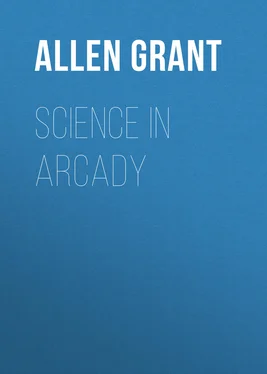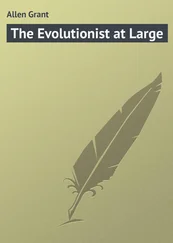Grant Allen - Science in Arcady
Здесь есть возможность читать онлайн «Grant Allen - Science in Arcady» — ознакомительный отрывок электронной книги совершенно бесплатно, а после прочтения отрывка купить полную версию. В некоторых случаях можно слушать аудио, скачать через торрент в формате fb2 и присутствует краткое содержание. Жанр: foreign_edu, История, на английском языке. Описание произведения, (предисловие) а так же отзывы посетителей доступны на портале библиотеки ЛибКат.
- Название:Science in Arcady
- Автор:
- Жанр:
- Год:неизвестен
- ISBN:нет данных
- Рейтинг книги:4 / 5. Голосов: 1
-
Избранное:Добавить в избранное
- Отзывы:
-
Ваша оценка:
- 80
- 1
- 2
- 3
- 4
- 5
Science in Arcady: краткое содержание, описание и аннотация
Предлагаем к чтению аннотацию, описание, краткое содержание или предисловие (зависит от того, что написал сам автор книги «Science in Arcady»). Если вы не нашли необходимую информацию о книге — напишите в комментариях, мы постараемся отыскать её.
Science in Arcady — читать онлайн ознакомительный отрывок
Ниже представлен текст книги, разбитый по страницам. Система сохранения места последней прочитанной страницы, позволяет с удобством читать онлайн бесплатно книгу «Science in Arcady», без необходимости каждый раз заново искать на чём Вы остановились. Поставьте закладку, и сможете в любой момент перейти на страницу, на которой закончили чтение.
Интервал:
Закладка:
My primitive idea, as I watched my islands in this their almost lifeless condition, was that the Gulf Stream and the trade winds from America would bring the earliest higher plants and animals to our shores. But in this I soon found I was quite mistaken. The distance to be traversed was so great, and the current so slow, that the few seeds or germs of American species cast up upon the shore from time to time were mostly far too old and water-logged to show signs of life in such ungenial conditions. It was from the nearer coasts of Europe, on the contrary, that our earliest colonists seemed to come. Though the prevalent winds set from the west, more violent storms reached us occasionally from the eastward direction; and these, blowing from Europe, which lay so much closer to our group, were far more likely to bring with them by waves or wind some waifs and strays of the European fauna and flora.
I well remember the first of these great storms that produced any distinct impression on my islands. The plants that followed in its wake were a few small ferns, whose light spores were more readily carried on the breeze than any regular seeds of flowering plants. For a month or two nothing very marked occurred in the way of change, but slowly the spores rooted, and soon produced a small crop of ferns, which, finding the ground unoccupied, spread when once fairly started with extraordinary rapidity, till they covered all the suitable positions throughout the islands.
For the most part, however, additions to the flora, and still more to the fauna, were very gradually made; so much so that most of the species now found in the group did not arrive there till after the end of the Glacial epoch, and belong essentially to the modern European assemblage of plants and animals. This was partly because the islands themselves were surrounded by pack-ice during that chilly period, which interrupted for a time the course of my experiment. It was interesting, too, after the ice cleared away, to note what kinds could manage by stray accidents to cross the ocean with a fair chance of sprouting or hatching out on the new soil, and which were totally unable by original constitution to survive the ordeal of immersion in the sea. For instance, I looked anxiously at first for the arrival of some casual acorn or some floating filbert, which might stock my islands with waving greenery of oaks and hazel bushes. But I gradually discovered, in the course of a few centuries, that these heavy nuts never floated securely so far as the outskirts of my little archipelago; and that consequently no chestnuts, apple trees, beeches, alders, larches, or pines ever came to diversify my island valleys. The seeds that did really reach us from time to time belonged rather to one or other of four special classes. Either they were very small and light, like the spores of ferns, fungi, and club-mosses; or they were winged and feathery, like dandelion and thistle-down; or they were the stones of fruits that are eaten by birds, like rose-hips and hawthorn; or they were chaffy grains, enclosed in papery scales, like grasses and sedges, of a kind well adapted to be readily borne on the surface of the water. In all these ways new plants did really get wafted by slow degrees to the islands; and if they were of kinds adapted to the climate they grew and flourished, living down the first growth of ferns and flowerless herbs in the rich valleys.
The time which it took to people my archipelago with these various plants was, of course, when judged by your human standards, immensely long, as often the group received only a single new addition in the lapse of two or three centuries. But I noticed one very curious result of this haphazard and lengthy mode of stocking the country: some of the plants which arrived the earliest, having the coast all clear to themselves, free from the fierce competition to which they had always been exposed on the mainland of Europe, began to sport a great deal in various directions, and being acted upon here by new conditions, soon assumed under stress of natural selection totally distinct specific forms. (You see, I have quite mastered your best modern scientific vocabulary.) For instance, there were at first no insects of any sort on the islands; and so those plants which in Europe depended for their fertilisation upon bees or butterflies had here either to adapt themselves somehow to the wind as a carrier of their pollen or else to die out for want of crossing. Again, the number of enemies being reduced to a minimum, these early plants tended to lose various defences or protections they had acquired on the mainland against slugs or ants, and so to become different in a corresponding degree from their European ancestors. The consequence was that by the time you men first discovered the archipelago no fewer than forty kinds of plants had so far diverged from the parent forms in Europe or elsewhere that your savants considered them at once as distinct species, and set them down at first as indigenous creations. It amused me immensely.
For out of these forty plants thirty-four were to my certain knowledge of European origin. I had seen their seeds brought over by the wind or waves, and I had watched them gradually altering under stress of the new conditions into fresh varieties, which in process of time became distinct species. Two of the oldest were flowers of the dandelion and daisy group, provided with feathery seeds which enable them to fly far before the carrying breeze; and these two underwent such profound modifications in their insular home that the systematic botanists who at last examined them insisted upon putting each into a new genus, all by itself, invented for the special purpose of their reception. One almost equally ancient inhabitant, a sort of harebell, also became in process of time extremely unlike any other harebell I had ever seen in any part of my airy wanderings. But the remaining thirty new species or so evolved in the islands by the special circumstances of the group had varied so comparatively little from their primitive European ancestors, that they hardly deserved to be called anything more than very distinct and divergent varieties.
Some five or six plants, however, I noted arrive in my archipelago, not from Europe, but from the Canaries or Madeira, whose distant blue peaks lay dim on the horizon far to the south-west of us, as I poised in mid-air high above the topmost pinnacle of my wild craggy Pico. These kinds, belonging to a much warmer region, soon, as I noticed, underwent considerable modification in our cooler climate, and were all of them adjudged distinct species by the learned gentlemen who finally reported upon my island realm to British science.
As far as I can recollect, then, the total number of flowering plants I noted in the islands before the arrival of man was about 200; and of these, as I said before, only forty had so far altered in type as to be considered at present peculiar to the archipelago. The remainder were either comparatively recent arrivals or else had found the conditions of their new home so like those of the old one from which they migrated, that comparatively little change took place in their forms or habits. Of course, just in proportion as the islands got stocked I noticed that the changes were less and less marked; for each new plant, insect, or bird that established itself successfully tended to make the balance of nature more similar to the one that obtained in the mainland opposite, and so decreased the chances of novelty of variation.
Hence, it struck me that the oldest arrivals were the ones which altered most in adaptation to the circumstances, while the newest, finding themselves in comparatively familiar surroundings, had less occasion to be selected for strange and curious freaks or sports of form or colour.
The peopling of the islands with birds and animals, however, was to me even a more interesting and engrossing study in natural evolution than its peopling by plants, shrubs, and trees. I may as well begin, therefore, by telling you at once that no furry or hairy quadruped of any sort—no mammal, as I understand your men of science call them—was ever stranded alive upon the shores of my islands. For twenty or thirty centuries indeed, I waited patiently, examining every piece of driftwood cast up upon our beaches, in the faint hope that perhaps some tiny mouse or shrew or water-vole might lurk half drowned in some cranny or crevice of the bark or trunk. But it was all in vain. I ought to have known beforehand that terrestrial animals of the higher types never by any chance reach an oceanic island in any part of this planet. The only three specimens of mammals I ever saw tossed up on the beach were two drowned mice and an unhappy squirrel, all as dead as doornails, and horribly mauled by the sea and the breakers. Nor did we ever get a snake, a lizard, a frog, or a fresh-water fish, whose eggs I at first fondly supposed might occasionally be transported to us on bits of floating trees or matted turf, torn by floods from those prehistoric Lusitanian or African forests. No such luck was ours. Not a single terrestrial vertebrate of any sort appeared upon our shores before the advent of man with his domestic animals, who played havoc at once with my interesting experiment.
Читать дальшеИнтервал:
Закладка:
Похожие книги на «Science in Arcady»
Представляем Вашему вниманию похожие книги на «Science in Arcady» списком для выбора. Мы отобрали схожую по названию и смыслу литературу в надежде предоставить читателям больше вариантов отыскать новые, интересные, ещё непрочитанные произведения.
Обсуждение, отзывы о книге «Science in Arcady» и просто собственные мнения читателей. Оставьте ваши комментарии, напишите, что Вы думаете о произведении, его смысле или главных героях. Укажите что конкретно понравилось, а что нет, и почему Вы так считаете.












